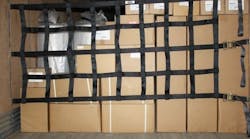During the 2018 Commercial Vehicle Safety Alliance’s Roadcheck blitz, 13% of all the out of service violations were for insufficient cargo securement. We can all imagine the potential consequences when a driver fails to secure the cargo on a trailer properly. Cargo securement is considered so important that many of the securement violations are seven-point violations under CSA.
But what happens when there is a cargo securement violation in a sealed trailer or intermodal container? The answer is the driver and the fleet are held responsible even though they played no role in securing the cargo in the first place, or at all.
It seems that for security reasons more and more loads are sealed by the shipper before going to the carrier. In essence, the carrier gets a sealed trailer that often has a lock on it that cannot be opened by the carrier. The goal is to ensure there are no security breaches while the load is en route to its delivery destination.
In May, CVSA asked the Federal Motor Carrier Safety Administration and the Canadian Council of Motor Transport Administrators to look for a way to let roadside inspectors cite not only drivers and carriers but also shippers for these types of cargo securement violations.
I think that is an idea has some merit. If the fleet and the driver have no access to the load to secure it why should they be held solely responsible for whether it is secure or not? Shouldn’t the people who secured the load and then sealed it be held accountable too?
I am not sure how that would work, but I have no doubt there are people out there who have some suggestions on how this can be done. It seems to me if drivers are going to risk getting CSA violations for something they have no control over, that there should be some penalty to the people who did not properly secure a load before they sealed it.
After all, fair is fair.



